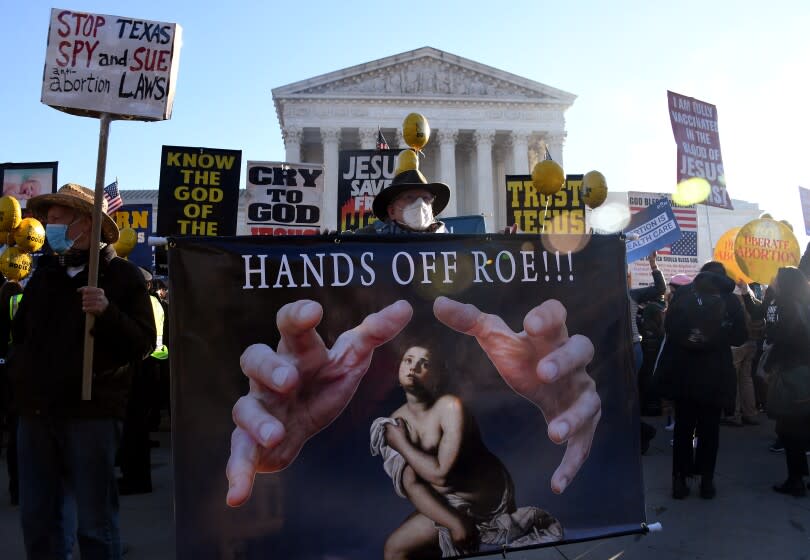Letters to the Editor: Supreme Court might overturn Roe and allow mandatory motherhood. What about fathers?

To the editor: No one likes abortion, but some women make the decision privately to have one. Now, a number of states — including Mississippi, whose 15-week abortion ban is at the U.S. Supreme Court — presume to take this personal decision away from the individual. ("Please, Supreme Court, do not take abortion rights away from any women, anywhere," editorial, Nov. 29)
If these states do not want women to choose to end a pregnancy, they should make parenthood a more viable choice by providing the financial and social support many women need to become mothers. If they believe it is a woman who is solely responsible for becoming pregnant, then they should address the constant pressures faced by young women from men always pushing to have sexual access without any concern for the consequences.
State efforts to mandate motherhood for women who become pregnant would be more credible if similar efforts were made to mandate fatherhood. True, this would be an invasion of a father's privacy, but it is no different than what is being done to women.
If the father is unable to provide support, the state should be required to step in, since it is the state insisting that the pregnancy continue.
Margaret Hamilton, Portland
..
To the editor: Let's cut to the heart of the problem on abortion. It is not that men simply want to eliminate abortion — they want to continue their control of women.
If it were the law that women would carry the child to birth and the men would have to handle all of that expense plus be 100% responsible for raising and caring for the child until adulthood, they would likely reverse their stand.
This is just another way to control women, by taking advantage of women's nurturing sensibilities plus invariably skipping out on full-time caretaking and financial responsibilities.
Wanda Dameron, Canoga Park
..
To the editor: Your editorial states, "To put control over abortion access completely in the hands of capricious, politically motivated state legislators would be a devastating blow to women and their ability to control their own bodies."
In that sentence you have given us the reason for the horrible divisiveness that surrounds abortion rights.
If we were talking about a woman's finger or kidney, would we be having this discussion? Would anyone care if a woman decided to have surgery on any part of her body?
With abortion we are not talking about another body part; we are talking about a human embryo that is a "discrete entity." Simply put, a human embryo or fetus is another body growing inside of a woman and dependent on it, but not part of it. It is a distinct living human organism.
It is imperative for a woman to be able to choose to bear a child because this choice can have a huge impact on her life. But abortion as a solution is unacceptable to many of us, for many reasons.
So how do we resolve this? We can start with the facts. It's time to drop the euphemisms.
Linda Mele Johnson, Long Beach
..
To the editor: Your editorial cites the Center for Reproductive Rights' claim that abortion rights are "critical to gender equality."
This is absurd. Abortion rights are the clearest and most concrete example of gender inequality in U.S. law.
In the vast majority of cases, the right to abortion is exercised not so much as a right to control one's body, but almost entirely as a right to opt out of parenthood. Yes, exercising this right has a huge influence on an individual's future; still, this is a right extended exclusively to women. That does not strike me as gender equality.
I am pro-choice, but I am also pro-truth. I accept the inequality established in Roe vs. Wade and recognize that the societal problems that would be created by extending the right to opt out of parenthood to men would almost certainly outweigh the abstract value of gender equality.
But when I hear abortion rights championed as equal rights, I must object.
Peter Marston, Glendale
This story originally appeared in Los Angeles Times.

